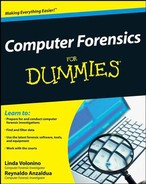In This Chapter
Getting certified in person or online
Staying current in computer forensics
After you're certified, you should keep your hard-earned certifications in force. Renewing them requires keeping current by reading articles, participating in events, and attending seminars. You might even be interested in a university certificate or degree programs.
In this chapter, we "pull a double" and borrow from the world of sports by offering a front ten and then a back ten.
You can obtain various types of certifications. Some are from vendors that offer product-specific training in using their software tools, and other certifications verify a broad foundation in computer networks or forensics methods.
Here are ten certifications for you to consider, presented in alphabetical order. Other certifications may also be available now and in the future.
www.accessdata.com/Training/TrainAceOver.aspx
Training and certificates are provided by AccessData, at http://accessdata.com, the vendor offering Forensic Toolkit (FTK). AccessData Certified Examiner (ACE) certification requires that you demonstrate skill, knowledge, and ability in using AccessData imaging and analysis technology, FTK, Password Recovery Toolkit (PRTK), and Registry Viewer.
www.certified-computer-examiner.com/index.html
This vendor-neutral certification is open to anyone. A possible advantage to you is that you can take the exam over the Internet. The certificate is sponsored by the International Society of Forensic Computer Examiners www.isfce.com (ISFCE).
www.cops.org/cfce
The Certified Forensic Computer Examiner (CFCE) course is provided by International Association of Computer Investigative Specialists (IACIS), the international, volunteer, nonprofit corporation of law enforcement dedicated to education in the field of forensic computer science. To earn the CFCE certification, you must successfully complete the two-week training course and solve correspondence proficiency problems. This certification is only for law enforcement professionals.
www.cops.org/ceecs
CEECS training courses teach best practices in seizing computers and digital media. It's only for law enforcement professionals.
www.cisco.com/web/learning/le3/learning_certification_overview.html
Cisco offers a variety of excellent network and information security training programs and certificates. Training for the Cisco Certified Design Associate (CCDA) certification provides basic knowledge of network design. Training for the more advanced Cisco Certified Network Associate (CCNA) certification teaches how to install, configure, operate, and troubleshoot medium-size routed and switched networks. The certifications verify that the person possesses the respective abilities and expertise.
https://www.isc2.org/cgi-bin/content.cgi?category=539
To become a certified information systems security professional (CISSP), you must successfully complete two separate processes: examination and certification. The eligibility requirements to sit for the CISSP examination are completely separate from the eligibility requirements necessary to be certified. Experience is needed in order to obtain the certificate. Check out CISSP For Dummies, by Lawrence H. Miller and Peter H. Gregory (Wiley Publishing).
www.comptia.org http://certification.comptia.org
CompTIA certifications are well known and respected as one of the best ways to break into the information technology field and build a solid career. Certifications valuable to a computer forensics career are CompTIA Network+, CompTIA Security, and CompTIA A+.
www.guidancesoftware.com/training/EnCE_certification.aspx
The EnCase Certified Examiner (EnCE) certificate is available to public- and private-sector professionals in the use of Guidance Software's EnCase computer forensic software.
www.paraben-training.com
Paraben offers a wide range of forensics training, for cellphone, PDA, network, and mobile forensics. Although you don't become certified, the certificates of completion are worthwhile to own.
www.giac.org/certifications/security/gcfa.php www.sans.org/sans2008
Getting the GIAC Certified Forensic Analysts (GCFAs) certification means that you have the knowledge, skills, and abilities to handle advanced incident-handling scenarios, conduct formal incident investigations, and carry out forensic investigation of networks and hosts.
We added a "back ten" to this chapter because we want to keep you up-to-date. Research journals and degree programs dedicated to computer forensics continue to emerge. To keep up with advances and events, be sure to bookmark at least a few of these — and check this book's Web site for more links to cutting-edge computer forensics and e-evidence issues:
Journals and research
International Journal of Digital Evidence: Supported by the Economic Crime Institute (ECI) at Utica College and the Computer Forensics Research and Development Center (CFRDC). Find it at
www.ijde.org.Journal of Digital Forensics, Security and Law: A publication of the Association of Digital Forensics, Security and Law (ADFSL). Check it out at
www.jdfsl.org.National Institute of Justice Journal: Find it at
www.ojp.usdoj.gov/nij/journals/254/digital_evidence.html.Small Scale Digital Device Forensics Journal: Check out this site at
www.ssddfj.org.SANS' Information Security Reading Room: Find this site at
www.sans.org/reading_room/index.php.Education and research centers
Champlain College computer and digital forensics (CDF) degree program:
www.champlain.edu/majors/digitalforensicsPurdue University Cyber Forensics Lab master's area of specialization:
cyberforensics.purdue.eduRochester Institute of Technology (RIT) degree in information security and forensics (ISF):
nssa.rit.edu/~nssa/nssa/undergrad/isfBS.mamlUniversity of Central Florida (UCF) degrees and certificate:
www.ncfs.org/home.htmlUtica College, cybercrime investigations and forensics specialization:
www.onlineuticacollege.com/online-cyber-security-degree.asp
